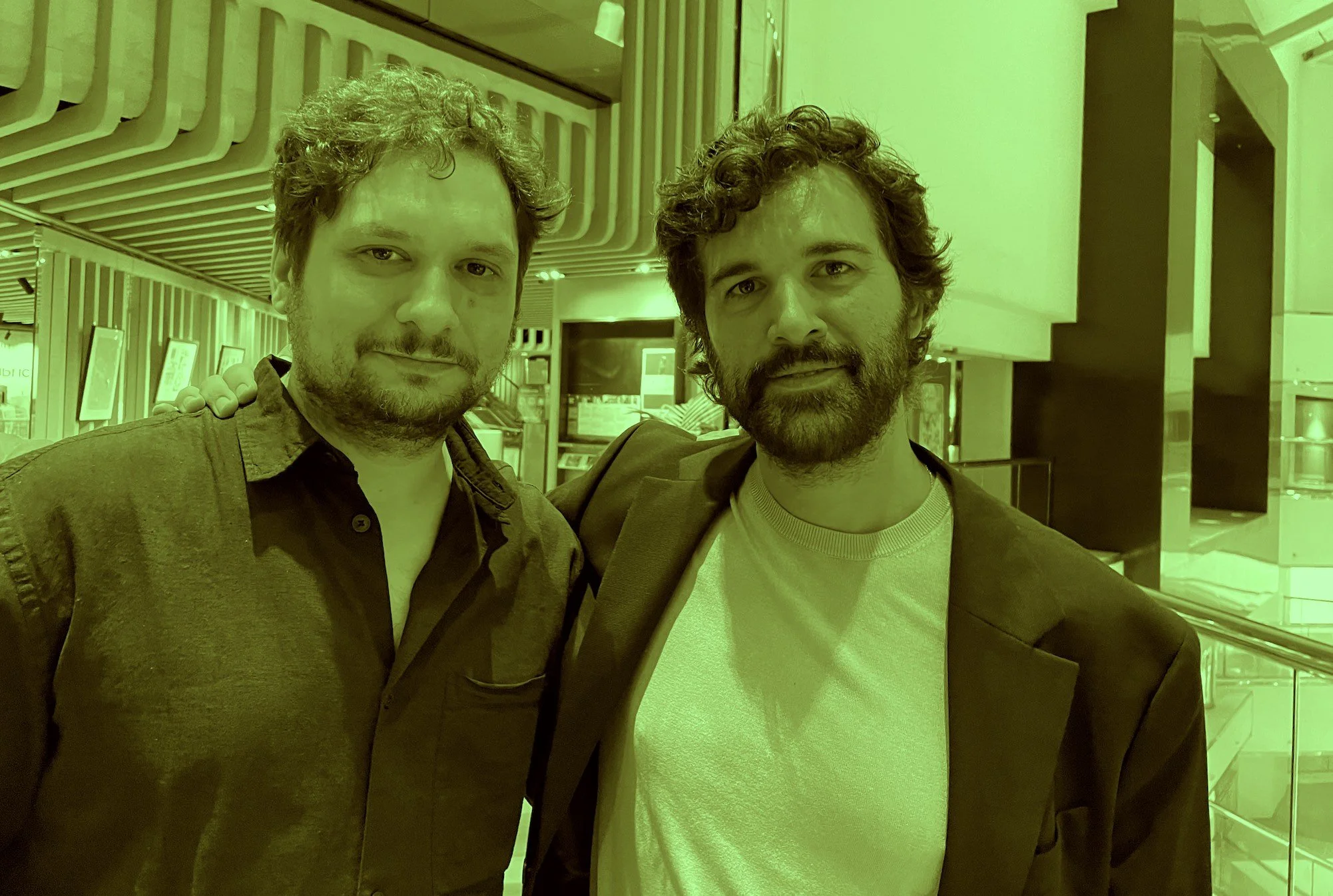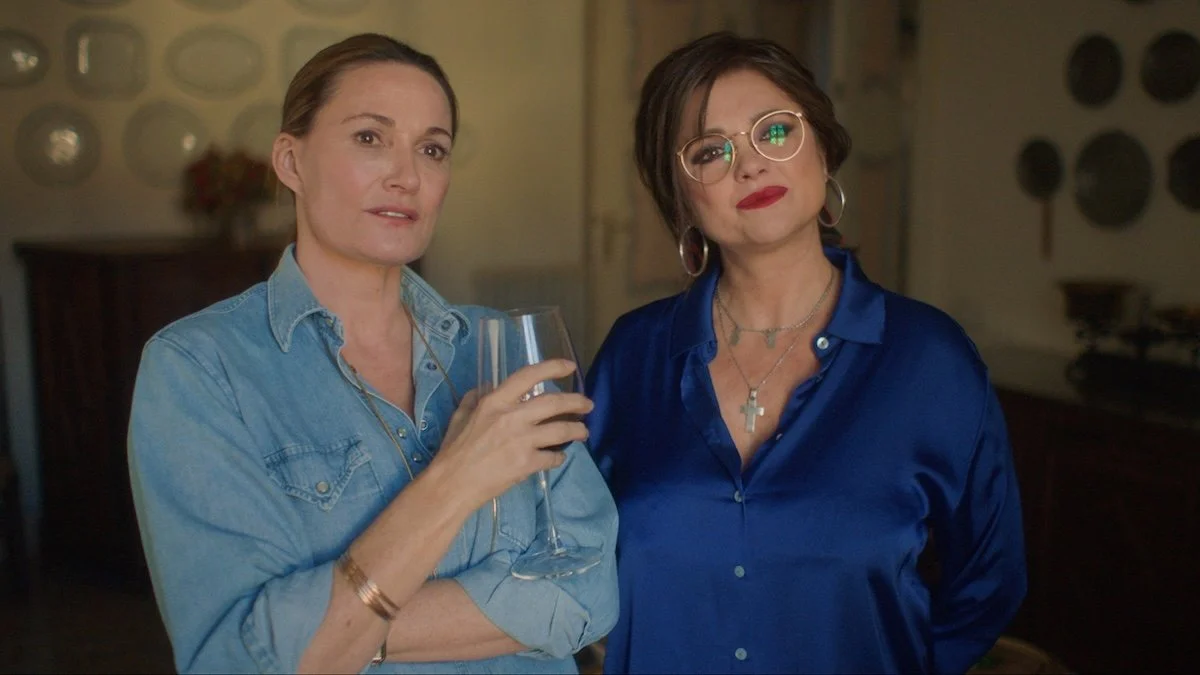The Upside of Repression
Argentinian filmmakers Juan Pablo Di Pace and Andrés pepe Estrada speak the unspoken in ‘Duino’.
When is a gay love triangle movie not really a gay love triangle movie? When it’s Duino, the first film by actor-writer-director Juan Pablo Di Pace and editor-writer-director Andrés Pepe Estrada. Closing out the Hong Kong Lesbian & Gay Film Festival this year, Duino is more a meditation on memory, loss, regret and reconciliation than a romance – an extremely meta meditation. Contrary to how things may appear, Di Pace and Estrada are not an old married couple. The duo banters back and forth like one, dropping shorthand left and right, but their real partnership is a filmmaking one that goes back to childhood in Buenos Aires. Or maybe Madrid. Estrada was born in Spain, relocating with the family when he was about 11. Di Pace was born and grew up in Argentina – until 11-ish? They describe it better:
“Funny enough, we met twice, and only the second time we became friends,” begins Di Pace. “The first time we were both, probably, 11. My family moved to Madrid for my dad’s work, and he was in Madrid for his dad’s work…” It’s here Estrada interjects. “No, I was in Madrid because I was born there. You were living there, then I left…” “And so his family decided they should go back to Buenos Aires,” Di Pace steamrolls. “My family went off to Madrid. And there was one day when…” “We met in the same school because I went to the Italian school he went to,” Estrada chimes in. “So two or three years later [his family] went back to Buenos Aires, and I was already there.” And on it goes – about sound levels, shooting time, and milestone events. “The character Paolo shows a tape to [Mati’s] mother, and that’s what triggers the whole story. And I did that – but I don’t remember anything,” says Estrada. “My mother has never forgotten,” Di Pace fires back.
That back and forth is less a sign of static as of long time aspiring collaborators that finally got their chance to actually work together – kind of like an Argentinian Spielberg and Lucas. “That’s a nice comparison,” Estrada says, a bit taken aback. It’s been a while coming. Di Pace and Estrada worked on a script for Duino for nearly a decade (Estrada: “He writes everything, and then I criticise everything.”), between film school for Estrada and Di Pace going off to become an actor/singer/dancer. Di Pace may be the more familiar face – he’s been in everything from Mamma Mia to Fuller House – but Estrada edited Santiago Mitre’s Oscar and BAFTA nominee Argentina, 1985. Finally, while shooting a film in Utah of all places, Di Pace had a chat with a producer that involved telling her about his time at school in Duino.
“I told her the story of what happened to me with the real Alexander, the school on the tapes, and my parents and his parents. When I finished the story, she’s like, ‘Well, you’ve got yourself a movie there. Why don’t you write that?’ So it became really easy. I think it was written in about two weeks.” In the time after COVID, Di Pace threw up his hands decided to get the film done somehow. Without traditional financing and with a lot of goodwill.
What finally became Duino unfolds across two timelines, one when a filmmaker, Matias – played by filmmaker Di Pace – recalls what may be his first great romance at the United World College in Duino, Trieste. As a younger, more perplexed Argentinian student, Mati (first-timer Santiago Madrussan, after his first ever audition) gets into one of those intense relationships with fellow student Alexander (Oscar Morgan, Gotham Nights), a Swede, you only get into in youth. In the “present” Mati can’t quite shake the memory and it’s having an impact on the film he’s working on: a semi-autobiographical film about an Argentinian student in Italy and his Swedish crush. Now, Di Pace did attend a UWC school in Italy. As a matter of fact, his best mate Estrada chased him there when his mother grew concerned by his mood changes after Alexander get expelled. In Duino, Estrada becomes Paolo, played by Tomás Kirzner – who happens to be superstar Araceli González’s son – who plays Mati’s mother Roma as a younger woman, next to her IRL husband Fabián Mazzei, who portrays Mati’s dad. Estrada restricted himself to writing and editing duties, but Marta Beatriz Maineri as the present day Roma is Di Pace’s actual mother, and she chipped in with costume and art direction help. But Mati is not Juan Pablo – mostly. Make sense?
“I would say the young version of me has quite a few things that are faithful to real events,” Di Pace chuckles. “But at the end of the day it’s a fiction. We’re not trying to make a biography. It’s more about having found something in both our lives that was cinematic, in a way. There was drama, there was intrigue, there was love, there was coming out, there was memory and longing.”
Which is where the non-gay love triangle comes in. “I think the central piece of the film is that it’s a reflection between past and present, and trying to decided what’s real. What exactly do you remember of things, and what are you making up or misremembering,” says Estrada, minutes after essentially demonstrating the film with his version of how the two met. And true enough, Duino blurs the line between fiction and reality – which Di Pace had every intention of doing – and makes the story less about Mati and Alexander’s sexuality as about the awkward process of figuring that out and defining the undefined. The triangle emerges when Alexander’s sister arrives for Christmas and disrupts the process by being so much more together than either of them. On top of that, Duino and Di Pace subvert expectations of the LGBTQ (or any) romance: Alexander and Mati never really get together. We’re trained to expect that explicit moment and Di Pace refused to go there.
“We were talking about this yesterday in the car, actually, about how ending just feels like what would happen in real life. One of the reasons to make this movie the way we made it was to talk about the things that are never said, never expressed,” he says. “Oscar Wilde used to talk a lot about how repression is one of the most creative elements in art. When you don’t say things there’s an inner world and an unspoken drama that is so interesting to watch. So that, plus the way we sort of hold on to a memory like it’s a prehistoric insect and Amber, something so precious that the moment you put words to it you destroy it, was why we never really wanted to make a point of it. A finite story where people get together wasn’t really what Duino was about. It was about the stuff in between.”
Di Pace won’t claim to have found his cinematic voice just yet, but the shaggy naturalism and unfussy vibe has a lot to do with the school itself. The real UWC was used for the primary location and real UWC students were in front of and behind the camera. “That’s where that rawness comes from. Acting and schools and all that can sometimes be very harmful to a person’s talent. That’s why you see a lot of kid actors who are a bit hammy. I love the fact that there was no time to learn. We just had to do it,” recalls Di Pace tipping his hat to that school as exactly the kind of space that breeds non-judgy personal exploration. He calls Kurt Hahn’s post-war experiment “education’s best kept secret. It’s a shame, because more people should know about it.” Heads up: there’s a UWC in Wu Kai Sha.
Despite the melodrama sometimes inherent to unpolished production, Duino is far from it. It trades in heightened emotion, but only the stone-coldest among us would be unaffected by it. The tension baked into the structures Mati and Alexander have to navigate and the clumsiness of well-meaning parents isn’t Shakespearean tragedy but it is recognisable. In perhaps the film’s stand-out scene, Madrussan absolutely nails the sense of loss for something that never was when it seems as if Mati may never speak to Alexander again (FYI real life Alexander and Di Pace do, indeed, speak again). It distills the story down to its essence. “The thing we said about the undefined things in the relationship, I think are for the audience to feel, and that’s what completes the movie,” says Estrada. “It’s the heart of the film,” adds Di Pace. “So we couldn’t get that scene wrong.” He tosses out a hilariously crude metaphor. Estrada gives him The Look. Married.
As this year’s HKLGFF closer, it’s easy to demand Di Pace position Duino within the queer cinema canon, but he’s more focused on making art that everyone recognises. “I saw something that [Quentin] Tarantino said, which touched me very deeply. He said something along the lines of, if it makes you uncomfortable, you should tell it. And there was a lot of that in this movie.” Sure, ultimately it’s a love story about longing and growing up, but the universality of the story is what spurred on Di Pace and Estrada. “Every single human has a story,” finishes Di Pace. “I see memories as scenes. Maybe it’s because I come from a dramatic family.” He shrugs. “I think you can tell a story about anything.”
Where we were
Kubrick @ MOViE MOViE Cityplaza • Hong Kong Lesbian & Gay Film Festival 2024
Hong Kong • September 21, 2024





